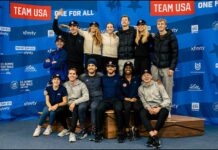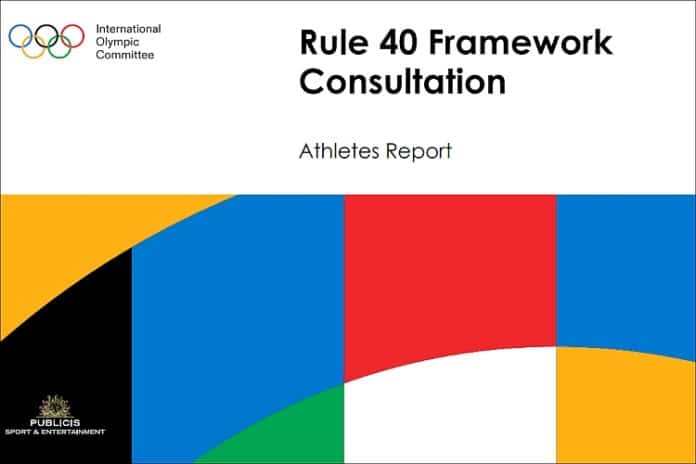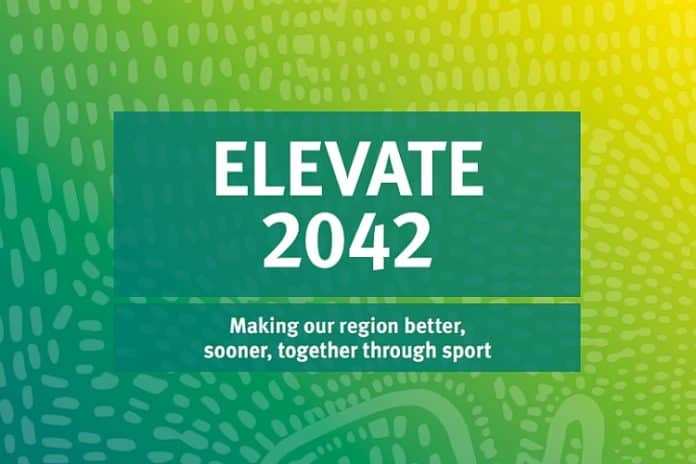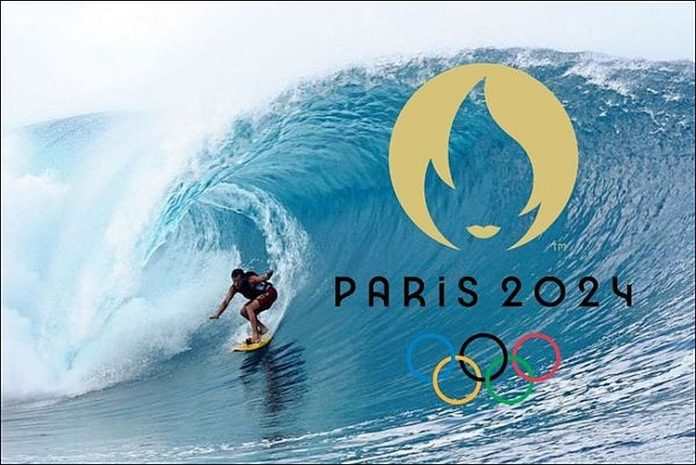★ The Sports Examiner: Chronicling the key competitive, economic and political forces shaping elite sport and the Olympic Movement.★
★ To get The Sports Examiner by e-mail: sign up here! ★
≡ THE 5-RING CIRCUS ≡
1. FIG rules for “neutral” gymnasts published, but with questions
2. IOC’s Rule 40 athlete survey received just 1.89% response!
3. Swiss confirm 2030 Winter bid, but with added options
4. Lyles and Richardson top USATF awards for 2023
5. U.S, men wait late, score 3-0 win over Trinidad & Tobago
● The International Gymnastics Federation (FIG) published its detailed rules for Russian and Belarusian athletes to apply to be approved as “neutral” athletes for competitions in 2024. As written, the rules are quite strict, including the use of only light blue uniforms for any athletes who are approved, without any identifying symbols. This will be a process, with questions still to be answered.
● A post-Tokyo 2020 and post-Beijing 2022 survey compiled for the International Olympic Committee concerning athlete sponsorship visibility during the Games was offered to 14,254 Olympians. Just 269 replied, or 1.89%. But there were interesting indications from even that small sample, especially that athletes need education on the business side of their lives.
● The Swiss Olympic Committee completed its bid file for the 2030 Olympic Winter Games and will present it to the IOC’s Future Host Commission next week, but also to the Swiss Sports Parliament on the 24th for its approval. The Swiss also have the idea to bid for the multi-port European Championships, possible for 2026!
● Sprint stars Noah Lyles and Sha’Carri Richardson were named the winners of the USATF’s 2023 Jesse Owens and Jackie Joyner-Kersee awards for the top male and female athletes in the U.S.
● The U.S. men’s National Team could not get a goal on Trinidad & Tobago in the first leg of their CONCACAF Nations League quarterfinal in Austin, Texas, but Ricardo Pepi, Antonee Robinson and Gio Reyna scored within 7:23 of each other in the 82-86-89th minutes for a 3-0 victory.
● Panorama: Paris 2024 (2: air taxi service rebuffed by Paris City Council; draft Olympic Truce resolution coming next week) = Commonwealth Games (Jenkins new CGF President as a 2026 solution is being sought) = World Anti-Doping Agency (new sanctions coming at Foundation Board meeting Friday) = Russia (IOC called “totalitarian” by Russian Olympic Committee) = Athletics (2: Kenyan anti-doping head says huge shock coming; British runner gets year ban for using a car during a race!) = Football (28th anniversary of the debut of FIFA.com) = Gymnastics (Biles vault formally added to Code of Points) ●
1.
FIG rules for “neutral” gymnasts published, but with questions
The rules for Russian and Belarusian gymnasts for participation as “neutral” individual athletes have been published by the Federation Internationale de Gymnastic, taking up eight pages of small type and effective as of 9 November.
The well-known prohibitions against Russian and Belarusian teams, doping requirements, and no national symbols are included. The key provisions are on what constitutes “neutrality,” with a significant prohibited list:
“Neutrality will be evaluated through the following criteria:
“1) No link with the Russian or Belarusian military or with any other national security agency
“Gymnasts/athletes and support personnel who are or become contracted or are or become in any way connected to the Russian or Belarusian military, including any affiliated entities, or with national security agencies since the beginning of the conflict (24 February 2022) cannot participate in FIG sanctioned events.
“2) No communication associated with Russia or Belarus
“Gymnasts/athletes and support personnel must refrain from any activity or communication, either verbal, non-verbal or written, associated with the national flag, anthem, emblem or any other symbol of the Russian Federation, the Republic of Belarus, their NFs or NOCs, or from any support for the war in Ukraine in any official venue or in the media (including interviews, social media, retweets and reposted messages on Twitter, forwarded messages, etc.) at any time since the beginning of the military aggression in Ukraine by the Russian Federation and the Republic of Belarus.
“Gymnasts/athletes and support personnel must not make any public statements or comments or take any action or behave in any way that may prejudice the interests of the competition, its integrity or the participant’s neutrality required as a condition for participation.
“3) No support for the war in Ukraine
“Only gymnasts/athletes and support personnel who have not supported nor are supporting the war in Ukraine may participate in FIG sanctioned events.
“Gymnasts/athletes and support personnel employed by or contracted to the Russian and Belarusian military or national security agencies are considered as supporting the war.
“Any other form of verbal, non-verbal or written expression, explicit or implicit, at any time since the beginning of the war in Ukraine, in particular public statements, including those made in social media, participation in pro-war demonstrations or events, and the wearing of any symbol in support of the war in Ukraine, for example the ‘Z’ symbol, are considered to be acts of support for the war in Ukraine.”
No two sets of “neutrality” rules are exactly the same between the various international sports federations which have posted them. Although the International Olympic Committee suggested a coordinated response to its 28 March recommendations on allowing individual “neutral” Russian and Belarusian athletes to compete internationally, the different sets of rules actually work in its favor as a real-time test of what works and what does not.
There is an application fee, the amount of which is not specified, but which must be received by the FIG prior to the review. There is no mention about how the fee is to be paid, especially since payment methods out of Russia and Belarus are more difficult now.
As to uniforms and music:
● “Women’s competition leotard, unitard or competition shirt must be of a solid light blue colour. Men’s competition singlet, unitard or competition shirt must be of a solid light blue colour. Men’s competition pants or shorts must be completely white.”
● “In Rhythmic Gymnastics, the hand apparatus must be completely white.”
● “[A]ny routine music used during the FIG Sanctioned event by an Individual Neutral Athlete must be neutral.”
All music must be approved by the FIG. And there are continuing restrictions:
“To adhere to the requirement of neutrality, Individual Neutral Athletes and their support personnel must refrain from any activity or communication associated with the national flag, anthem, emblem or any other symbol of the Russian Federation, the Republic of Belarus, their NFs or NOCs, or support for the war in Ukraine, at any official venue or in the media (including interviews, social media – retweets, reposting, etc.) prior to, during and following the international sports competition. This includes any national events related to their participation in the competition.
“They must not make any statements or comments, take any action, or conduct themselves in any manner that may be prejudicial to the interests of the competition, its integrity or the participant’s neutrality required as a condition of participation.”
The regulations are strict as written; it will be interesting to see what happens in actual practice.
2.
IOC’s Rule 40 athlete survey received just 1.89% response!
Prior to the Tokyo 2020 Olympic Games and the Beijing 2022 Olympic Winter Games, much attention was paid to Rule 40.3 of the Olympic Charter, which was amended in 2019 to allow more flexibility for athletes to showcase their personal sponsors who are not also Olympic sponsors.
No direct mention of the Games was allowed, but congratulatory messages were permitted if disclosed about two months prior to the Games. Not much, but more than the prior total ban on communications by non-Olympic sponsors.
As promised, the International Olympic Committee did a survey after the Tokyo and Beijing Games to ask about the new experience with the amended Rule 40. But very few were interested.
Completed in September, the 30-slide report by Publicis Sport & Entertainment, announced on Thursday, showed that of 14,254 athletes registered on the IOC’s Athlete365 portal, just 270 took the survey, or 1.89%. The report notes:
“For this project, there was a lower-than-optimal response rate, meaning that with [270] Olympians, less than 2% completed the survey. …
“Results are therefore limited to the participants of the survey and we refrain from drawing general conclusion of the entire athlete population. Nevertheless, some results are interesting to report because while limited in number, those who made the efforts to respond have important views that should be considered.”
The respondents were from 88 countries and 38 of 40 sports involved, with the most responses from France (8%), the U.S. (8%) and Italy (6%). By sport, the leading responders were from track & field (19%) and skiing and snowboarding (14%) and then aquatics (8%). No other sport registered more than 4%.
Of the group that responded, the results were uninspiring:
● Just 68% said they were “aware” of Rule 40, with 25% not aware and 7% didn’t remember.
● 55% said they learned about the Rule 40 regulations from their National Olympic Committee, and 17% from their agent or sponsor. Media reports informed another 15%.
● 68% of the respondents read the “Key Principles” document which explained the rules, about 60% read the two companion documents.
● Of the respondents, 50% posted a “thank you” message to their sponsors during the Games (Tokyo or Beijing), but 26% did not … and did not know that they could!
How important is all this? The research showed that among the 199 Tokyo Olympians who responded, 66% had sponsorship deals. Among the 71 Beijing Winter Olympians, 73% had sponsorship deals. Of those folks, 91% said that had one or more personal sponsorships with non-Olympic Partner brands.
As the report deadpans in a footnote, “The IOC should look to improve communication about this allowance, so athletes better understand what they can and cannot do at Games-time.”
Observed: Despite the trivial level of participation in the survey, it points to a glaring area which needs support, not only from the IOC, but the National Olympic Committees and especially national federations.
Athletes have to be educated on what it means to be a “professional.”
There are expensive, rigorous, years-long training programs and licensing requirements in many countries to hold positions which can influence other people’s lives, including architects, attorneys, engineers, physicians and many others. Athletes are being required, more and more, to know about the often highly technical rules against doping, but this is still in its infancy.
With this survey, with just 1.89% responding, and more than a quarter of those not even knowing they could post a message saluting their non-Olympic sponsors, there is an obvious need for education.
This has to happen at the grass-roots level, because sponsorships are being given to younger and younger athletes, especially in the U.S., where the name-image-likeness rules have driven sponsorships to the high school level and even earlier.
Here, the IOC is well positioned to help, with summaries of best practices and documentation of what it allows at the Olympic Games. But the real action is at the national federation level, where free courses could be offered at conventions and regional and national championships.
This is coming, and the National Olympic Committees which take leadership roles will have happier athletes who understand better how to manage their business affairs as well as their athletic efforts.
3.
Swiss confirm 2030 Winter bid, but with added options
“It is now up to the Sports Parliament to give the green light to those responsible for the project to continue, and then to the IOC to decide whether to invite us to the next phase of the dialogue.
“But the interest and the constructive and benevolent critical support of the project by the Swiss media and public delight us.”
That’s Swiss Olympic President Juerg Stahl during a Wednesday meeting with reporters, explaining that the Swiss bid for the 2030 Olympic Winter Games is very much alive. The concept, to use the existing winter-sports facilities, drops the tradition of a host city and would create a national plan for the Games.
The timeline is a little odd, as the International Olympic Committee’s Future Host Commission for the Winter Games is expected to talk with the 2030 bidders from France, Sweden and Switzerland next Tuesday (21st), and the Swiss Sports Parliament to weigh in on the bid on Friday, 24 November.
Of significant note is that the Swiss concept for an Olympic Winter Games is aimed not only at 2030, but could be pursued for 2034 (against Salt Lake City) or 2038 or beyond. Prior Swiss bids have failed in referenda, but the 2030 plan is for a privately-funded Games using existing sites, and had 67% public approval in a recent poll. Noted Stahl:
“Having several regions reduces the risks. What also matters is to have relatively few investments to make and that there is little harm to nature.”
The expectations are that the IOC Executive Board will select candidates for “targeted dialogue” for 2030 and 2034 at its next meeting at the end of November.
The Swiss are looking at other events as well, with the ski federations already bidding for the 2028 FIS Games, with all of the Olympic disciplines and several more. And, there is interest in organizing the multi-sport European Championships that was very successfully held in Munich (GER) in 2022. Said Swiss Olympic Director General Roger Schnegg:
“The budget is obviously much smaller. But, here too, all of Switzerland could benefit from it. It is obvious that we would not organize the European Championships in 2030 if we got the Winter Games, but we see the possible synergies.”
But 2026 could be a possibility. Stahl emphasized, “We are very motivated to show that a small country like ours can do it.”
4.
Lyles and Richardson top USATF awards for 2023
USA Track & Field announced its major award winners for 2023 on Thursday, with Noah Lyles to receive the Jesse Owens Award and Sha’Carri Richardson selected for the Jackie Joyner-Kersee Award.
Lyles had a brilliant 2023, especially when it counted the most, winning three golds at the World Athletics Championships, in the men’s 100 m (9.83 co-world leader), 200 m (19.52) and anchoring the men’s 4×100 m relay (37.38 world leader).
He was undefeated in the 200 m, winning all eight races, including six finals, running a world-leading 19.47 at the Wanda Diamond League meet in London in July. He ran 12 100 m races, winning just seven, but after a third at the USATF Nationals, won all three of his races at the Worlds, including a lifetime best in the final at 9.83.
Richardson was also electrifying at the Worlds, and was busy all year, running 16 races in the 100 m and eight more at 200 m. She won the USATF title at 10.82 to make her first international team, then after barely making it into the Worlds final, won in a sizzling 10.65 to equal the world lead for 2023.
Not known as a 200 m star, Richardson qualified for Budapest with a second-place finish at the nationals, then won her heat at the Worlds, was second in her semi and ran a lifetime best of 21.92 to grab the bronze medal in the final. She followed up with a second gold, anchoring the U.S. women’s 4×100 m to a 41.03 win in the fastest time of 2023.
Shawnti Jackson, 18, the daughter of 2005 World men’s 400 m hurdles gold medalist Bershawn Jackson, was named the USATF Youth Athlete for 2023. She set a U.S. prep record in the women’s 100 m at 10.89, also the World U-20 leader for 2023, and reached the USATF Nationals semifinals. She won the USATF Junior title in the women’s 200 m at 22.48, then claimed the World U-20 leading time of 22.35 at the Pan American Junior Championships in August. Her 100 m mark ranked her second all-time on the World U-20 list and her 22.35 has her seventh all-time in the 200 m.
The USATF Nike Coach of the Year is Dennis Mitchell, who mentored sprint stars including Richardson, TeeTee Terry (10.83) and men’s 200 m star Kenny Bednarek, the Tokyo Olympic silver medalist, who clocked 19.79 in 2023, no. 7 on the world list and fifth at the Worlds and the Diamond League Final runner-up. Mitchell, 57, a great sprinter himself, was the Olympic 100 m bronze winner in 1992 and at the 1991 and 1993 World Championships, with a lifetime best of 9.91. He served a two-year doping ban from 1998-2000 for steroids, but has been a U.S. national teams relay coach since then.
These awards will be formally presented at the USATF Annual Meeting in Orlando, Florida, on 2 December.
5.
U.S. men wait late, score 3-0 win over Trinidad & Tobago
The U.S. men’s National Team was back in action at the CONCACAF Nations League quarterfinals on Thursday, facing Trinidad & Tobago in Austin, Texas and after a frustrating for 80 minutes, got untracked for a 3-0 win.
The American offense was in full flight from the opening kick, with the first 12 minutes spent continuously harassing the Trinidad & Tobago defense – with nine in front of the ball – and a wicked shot from defender Sergino Dest that was saved in the second minute.
The U.S. had 75% of possession through the first half-hour, but no goals. Then T&T midfielder Noah Powder took the legs out from under U.S. midfielder Weston McKennie in the 37th and received a second yellow card, leaving the Soca Warriors with 10 players for the rest of the match. But T&T keeper Denzil Smith was equal to the challenge, smothering everything sent his way; the U.S. ended the half with 75% possession and a 7-0 lead on shots.
Trinidad & Tobago packed in the defense to start the second half, as Smith made a quick save on a through-ball from McKennie for attacking midfielder Malik Tillman in the 53rd minute and another save against Tillman in the 54th. And Smith rejected a rocket from midfielder Yunus Musah from the top of the box in the 57th.
In the 59th, midfielder Daniel Phillips was called for a foul in the box against McKennie for a penalty, but the call was reversed after a video review. By the 70-minute mark, the U.S. was up to 77% of possession and 14-0 on shots, but still no score. A laser from Dest in the 73rd was punched away by Smith, but was so hard, he needed some minutes to recover. A header from substitute striker Brenden Aaronson – off a Dest service from the right side – went just wide in the 79th.
Finally the break came in the 82nd, off a left-footed liner from defender Antonee Robinson from the left side that was re-directed by sub striker Ricardo Pepi with his right foot past Smith and into the far right side of the goal for the 1-0 lead.
The U.S. continued in possession, kept attacking and then Robinson was clear at the top of the box and ripped a left-footed riser into the top of the net for a 2-0 lead in the 86th. Suddenly, it was a rout, as Gio Reyna took a feed from striker Folarin Balogun in the box and sent a left-footer into the net for a 3-0 edge in the 89th. Three scores in 7:23, after nothing for 81.
The U.S. ended with 76% possession and a 26-1 shots advantage, and is now 22-3-4 all-time vs. Trinidad & Tobago. Matt Turner was barely troubled in goal for the U.S.
The second leg of the home-and-home matches will be on 20 November in Port of Spain; the U.S. is trying for a third straight CONCACAF Nations League title.
≡ PANORAMA ≡
● Olympic Games 2024: Paris ● The occasionally-ballyhooed concept of air taxis circulating over Paris during the 2024 Games might be dead. The Paris City Council was highly negative about the creation of a take-off and landing platform in the city during a discussion on Tuesday, however the national transportation ministry to decide in early 2024.
¶
The IOC announced that the draft resolution for the Olympic Truce for Paris 2024 will be introduced at the United Nations next Tuesday (21st). The draft is sponsored by the French government, supported by the IOC, the International Paralympic Committee and the Paris 2024 organizers.
The modern Olympic Truce was first introduced in support of the 1994 Olympic Winter Games in Lillehammer (NOR).
● Commonwealth Games ● The Commonwealth Games Federation, meeting in Singapore, elected Chris Jenkins of Wales as its new President, garnering 74 votes to 10 for New Zealand’s Kereyn Smith, the sole opponent. The announcement noted Jenkins’ three commitments on the future of the Commonwealth Games:
● Guide the Commonwealth Games to a sustainable model to attract host cities.
● Develop and strengthen the Commonwealth Games Associations.
● Ensure all voices are heard.
As regards the sustainability of the Commonwealth Games, the concept is to “re-model the Games, reducing the costs of hosting and exploring innovative solutions which allow more countries to host.”
CGF chief executive Katie Sadleir (GBR) told reporters that the question of the 2026 Commonwealth Games is expected to be resolved in some form by February 2024:
“We have been working intensely with Commonwealth Games Australia. They are very, very keen to keep the Games in Australia and so we’re working to support them with their inquiries.
“And then there are three other regions that we are having conversations with but they are very much of a preliminary sort of stage. But our aim is to be in a situation early in the new year to make a call on where a Games might go in 2026, 2027 or whether or not we might do something a bit different.
“We have started looking at alternative models and we’ll be continuing on with that work as well as we seek a host for ‘26.”
The CGF also expanded from 72 to 74 members with the addition of Gabon and Togo.
● World Anti-Doping Agency ● The WADA Executive Committee met Thursday in Montreal, and although no details will be released until after Friday’s Foundation Board meeting, President Witold Banka (POL) posted a short report on X (ex-Twitter) that included:
“A number of decisions were made by the ExCo in relation to compliance cases against certain Code Signatories, with new consequences being introduced.”
Stay tuned!
● Russia ● The river of vitriol from Russia toward the IOC continued on Thursday, with Russian Olympic Committee President Stanislav Pozdnyakov taking the microphone:
“Behind the screen of athletes’ interests, there is a policy of restrictions and bans on participation in competitions in the worst traditions of totalitarian regimes, which is what we observe. We hope that the IOC leadership will come to its senses and will comply with the ideals and principles that stood at the origins of the Olympic movement.”
Pozdnyakov added to the unhappy responses to IOC President Thomas Bach (GER) and his call for the International Federations to stay clear of Russia’s World Friendship Games in 2024, as a “politicized competition”:
“Any sporting event is free for anyone on the planet to attend.
“When illegitimate sanctions against Russian sports arose, the main need became to organize competitive practice for our athletes. The ban, which was introduced a year and a half ago, forced us to adjust the preparation plan, but did not limit the possibility of foreign athletes participating [in competitions] in Russia. Athletes who began to come to us say that competitions can and should be held here.
“We are eliminating the injustice that was committed by the IOC against our athletes. The Friendship Games, which will be held with great success next year, will serve two purposes: the peaceful mission of sport and the free participation of all athletes in competitions. And it is very important.
“They will eliminate the injustice of our athletes being excluded from international competitions. All three missions correspond to the Olympic ideals. Therefore, the speech of the head of the IOC is puzzling.”
Russian Sports Minister Oleg Matytsin echoed the explanation that the Friendship Games and other 2024 events are not designed to compete with the IOC:
“The first global project will be the ‘Games of the Future’ in Kazan. The Games of the BRICS countries in an open format will be held in Kazan in June, and the final big project in Russia will be the Friendship Games.
“We are not considering and have never positioned one, nor the second, nor the third event as a kind of alternative to anything else. These are independent new projects. They are aimed at creating a competitive environment here, ensuring Russian athletes participate in competitions on an international scale, which is still being hampered by some international federations and the International Olympic Committee.
“But we don’t have to prove anything to anyone. We have defined the standards for major projects. Russia was the host of the World Championships in football, athletics and aquatics, held two Universiades, and the Olympic Games in Sochi. I think everyone understands that Russia is a powerful and very reliable partner in the world of sports, and if we initiate something, we always act not against someone, but for. For development.”
● Athletics ● The Canadian site Athletics Illustrated cited comments from Anti-Doping Agency of Kenya head Sarah Shubutse that a major doping shock is coming:
“At the end of this month, we will sanction numerous athletes across part of our strategy in fighting the vice as we prepare for the 2024 Olympic Games in Paris, France. We want to send clean athletes to the Olympics to avoid the shame the nation has received in recent major championships.”
She said that ADAK is getting better at finding the athletes they need to find:
“We are now getting to know their (athletes in hiding) information. We are gathering information about their training camps, their coaches and their managers.”
But be warned, a shock is coming.
¶
Scottish ultra-marathoner Joasia Zakrzewski, 47, was banned by UK Athletics for 12 months for using a car for part of a race in which she “finished” in third place. The BBC reported:
“Zakrzewski accepted a medal and trophy for finishing third in the 2023 GB Ultras Manchester to Liverpool 50-mile race on 7 April.
“Tracking information later showed she travelled by car for about 2.5 miles before continuing the race.”
She was disqualified on 18 April, and the matter was referred to the UK Athletics disciplinary board.
● Football ● An anniversary reminder from Juan “Cheche” Vidal of the World Cup USA 1994 organizing committee on Thursday of the 28th anniversary of debut of the FIFA.com Web site. Per Vidal’s post on LinkedIn:
“[T]he actual birth of this pioneer sports information service on the internet was November 1994, when I presented the prototype of the portal to the then President Joao Havelange [BRA] and the then General Secretary Sepp Blatter [SUI] at the old FIFA headquarters in Zurich.
“My associate Alex Holt, also a colleague from the technology team of USA 94, helped me present the FIFA.com prototype. [Alex’s] historic role is still relevant, as he continues delivering information today as a senior editor of the official FIFA portal.
“Furthermore, FIFA.com was inspired on an even earlier technology milestone: the 1st ever official portal in the World Wide Web for an international sporting event, one of the groundbreaking solutions we developed for USA 1994 as part of a vision I had written in 1990.
“Interestingly, all the mission critical solutions created to run the 1994 World Cup were granted to FIFA as part of USA 1994’s legacy, a legacy that had a profound impact on the operations of FIFA World Cups for decades.”
Vidal founded a company which ran the FIFA.com service from 1995 to 2003, when FIFA took up the rights for themselves into the future. It’s another legacy of the under-appreciated 1994 World Cup organizers in the U.S., which changed the future of football not only in the United States, but as Vidal notes, created FIFA’s digital future as well.
● Gymnastics ● The Federation Internationale de Gymnastique (FIG) announced that the Women’s Technical Committee has approved the Yurchenko double pike vault as the “Biles 2″ elements in the FIG Code of Points after Simone Biles performed it at the World Artistic Championships in Antwerp (BEL). From the announcement:
“From now on the ‘YDP’ will be called the Biles 2, the FIG Women’s Technical Committee (WTC) announced this week. The ‘2′ is because Biles pioneered a different vault named for her in 2018.
“The Biles 2 vault is the fifth skill named for the U.S. superstar, approaching a record in the Women’s Artistic Gymnastics Code of Points. Only five-time Olympic champion Nellie Kim (URS), with seven, has more. Kenzo Shirai (JPN) and Saeedreza Keikha (IRI) each have six elements named for them in the men’s Code of Points.”
Biles’ new vault is one of four elements to be named for their creators following the Antwerp World Championships; Georgia Godwin (AUS) and Kaylia Nemour (ALG) had elements named for them on the Uneven Bars, and Alissa Moerz (AUT) had an element named on Floor Exercise.
¶
You can receive our exclusive TSX Report by e-mail by clicking here. You can also refer a friend by clicking here, and can donate here to keep this site going.
For our updated, 850-event International Sports Calendar (no. 4) for 2023 and beyond, by date and by sport, click here!






















